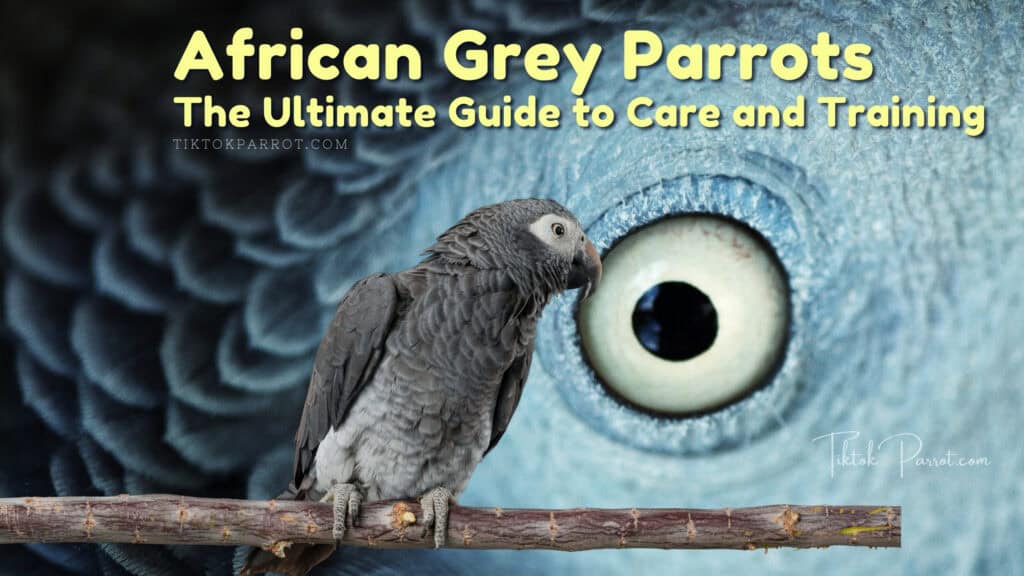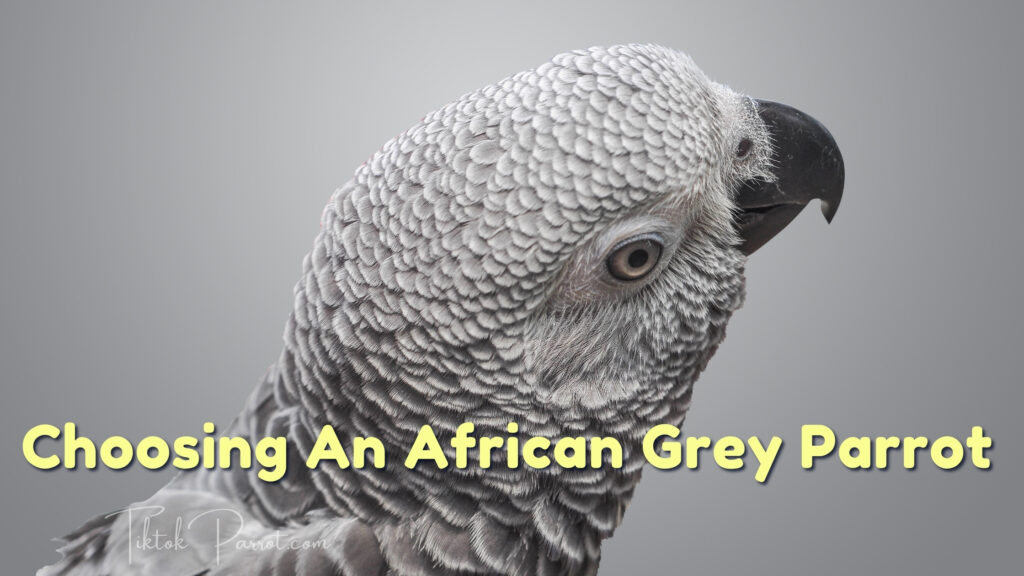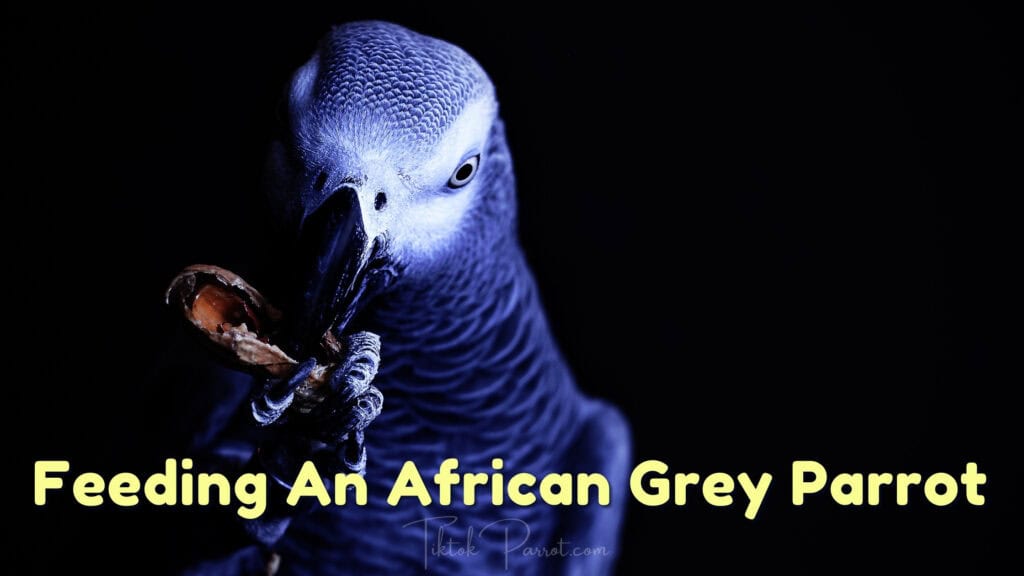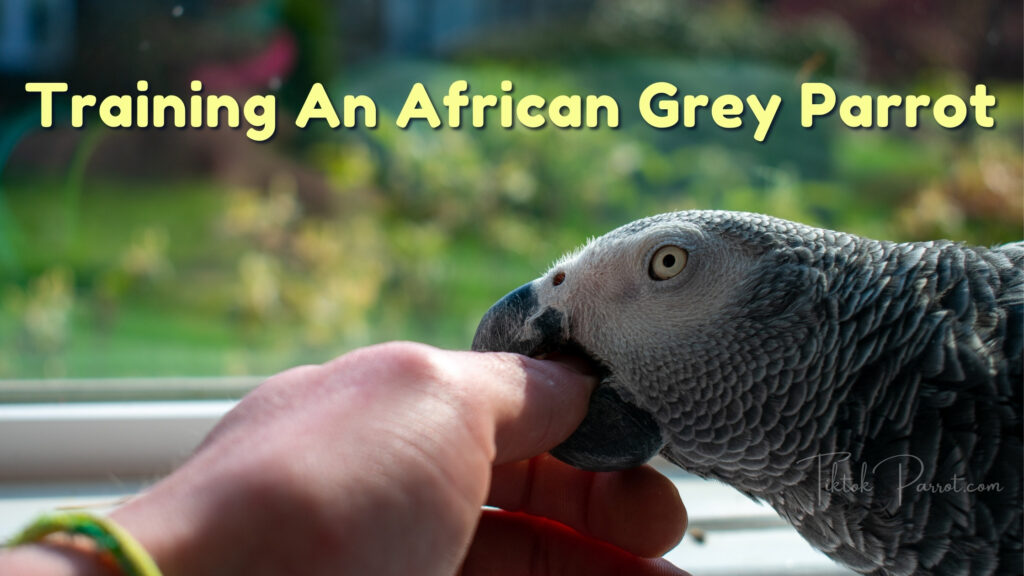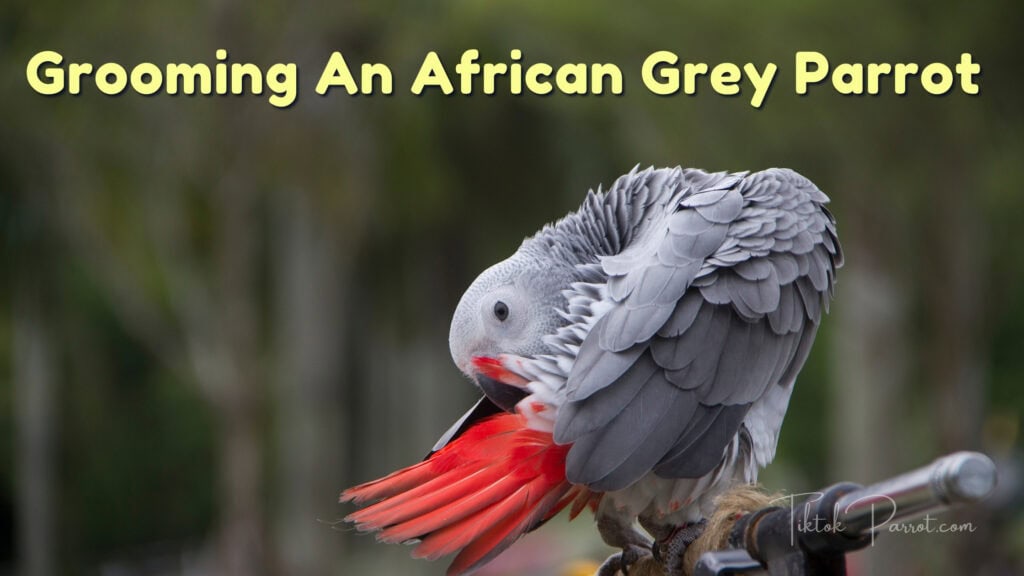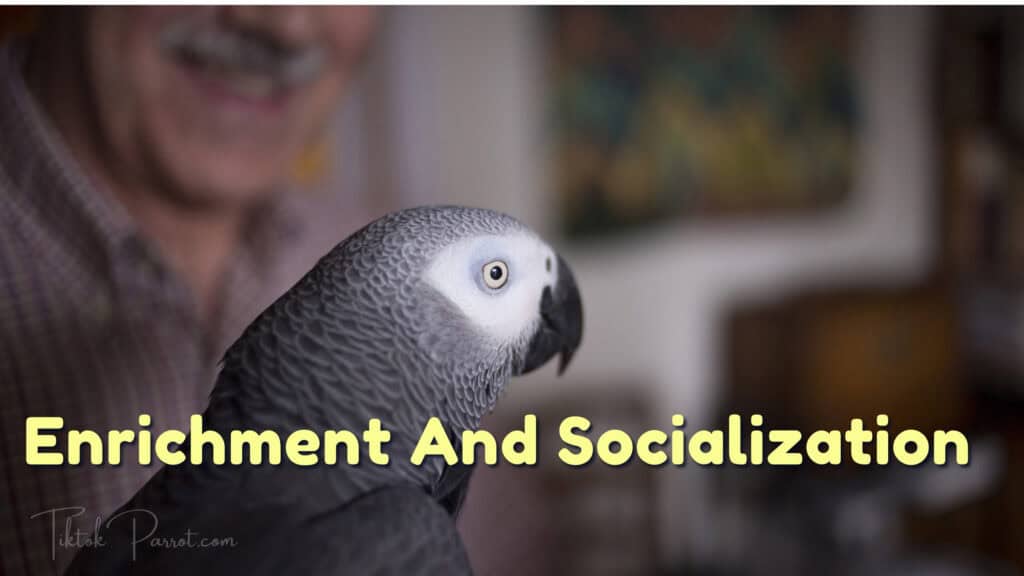African grey parrots (Psittacus erithacus) are intelligent, social, and generally docile birds that make excellent pets. However, they are also a long-lived species that requires a significant commitment in terms of time, money, and effort. Therefore, it is important to be well-informed about how to care for an African grey parrot before bringing one into your home.
Discover everything you need to know about caring for and training your African grey parrot. From feeding and housing to behavior and training, this ultimate guide has all the information you need to provide the best possible care for your feathered friend.
This article is a comprehensive resource for anyone looking to provide the best possible care for their African grey parrot. This guide covers all aspects of care, including feeding, housing, health, and behavior.
It also includes detailed information on training techniques and tips for building a strong bond with your bird. Whether you are a first-time parrot owner or an experienced bird enthusiast, this guide has something for everyone.
In this article, we will cover the following topics:
Choosing an African grey parrot: What to consider when selecting an African grey, including age, sex, and temperament.
Housing an African grey parrot: The size, type, and location of the cage, as well as the type of perches, toys, and other accessories that are needed.
Feeding an African grey parrot: The types of foods that should be included in an African grey’s diet, as well as the importance of providing a balanced and varied diet.
Training an African grey parrot: Tips and techniques for teaching your African grey basic obedience commands, as well as tricks and other forms of mental stimulation.
Health and wellness of African grey parrots: Common health issues that may affect African grey parrots, as well as the importance of regular check-ups and preventative care.
Grooming an African grey parrot: How to trim your African grey’s nails, beak, and feathers, as well as how to bathe them.
Enrichment and socialization: Ideas for providing mental and physical stimulation for your African grey, as well as the importance of socialization with both humans and other birds.
By following the guidelines outlined in this article, you will be able to provide your African grey parrot with the care and attention it needs to thrive in your home. So grab your coffee, sit back and read the complete guide about African Grey Parrot
Choosing An African Grey Parrot
What to consider when selecting an African grey, including age, sex, and temperament.
Choosing an African grey parrot is a big decision that requires careful consideration. These intelligent and social birds can live for 50 years or more in the captivity and a shorter life in wild, so it is important to select one that is right for your lifestyle and abilities. Here are some things to consider when choosing an African grey parrot:
Age: African grey parrots are intelligent and social birds that require a lot of time, attention, and training. They are also a long-lived species, with a lifespan of 50 years or more in the captivity. Therefore, it is generally best to choose an African grey that is at least a few years old. This will allow you to get to know the bird’s personality and needs before committing to a long-term relationship.
Sex: African grey parrots do not have visible differences in appearance between males and females. However, some people believe that males are more talkative and easier to train, while females are more independent and less demanding. Ultimately, the sex of the bird is not as important as its personality and compatibility with your lifestyle.
Temperament: African grey parrots are generally docile and easy to handle, but like any animal, they can have different personalities. It is important to choose a bird that is comfortable being handled and is not overly aggressive or fearful. Observing the bird in its living environment, or asking the current owner about its personality and habits, can give you a good idea of what to expect.
Health: African grey parrots are prone to certain health issues, such as feather picking, respiratory infections, and obesity. It is important to choose a bird that is in good health and has a history of regular check-ups and preventative care.
Source: It is important to choose an African grey parrot from a reputable source, such as a breeder or rescue organization. Avoid purchasing a bird from a pet store or backyard breeder, as these sources may not provide proper care or genetics testing.
By considering these factors, you can choose an African grey parrot that is well-suited to your lifestyle and abilities, and that will be a loving and rewarding companion for many years to come.
Housing An African Grey Parrot
The size, type, and location of the cage, as well as the type of perches, toys, and other accessories that are needed.
Proper housing is essential for the health and well-being of an African grey parrot. The size, type, and location of the cage, as well as the type of perches, toys, and other accessories, can all have a significant impact on your bird’s quality of life. Here are some things to consider when housing an African grey parrot:
Size of the cage: African grey parrots are active and need plenty of space to move around and stretch their wings. As a general rule, the cage should be at least 24 inches wide, 36 inches deep, and 36 inches tall. This will provide enough space for your bird to move freely and explore, as well as to climb and play.
Type of cage: The cage should be made of sturdy, non-toxic material, such as stainless steel or powder-coated steel. Avoid cages made of plastic or painted metal, as these materials can release toxic fumes when heated or cleaned. The cage should also have a secure, locking door to prevent your bird from escaping.
Location of the cage: The cage should be located in a room that is well-ventilated and free from drafts. Avoid placing the cage near windows or in direct sunlight, as these can cause temperature fluctuations that can be harmful to your bird. The cage should also be placed at a comfortable height for you to interact with your bird, such as at eye level or slightly above.
Perches: African grey parrots need a variety of perches to exercise their feet and keep their nails trimmed. The perches should be made of natural materials, such as wood or concrete, and should be of different sizes and shapes to provide a range of textures and challenges. Avoid perches made of plastic or sandpaper, as these can be harmful to your bird’s feet.
Toys: African grey parrots are intelligent and need plenty of mental stimulation to stay healthy and happy. Provide a variety of toys, such as chew toys, foraging toys, and puzzle toys, to keep your bird entertained and challenged. Rotate the toys regularly to prevent boredom.
Other accessories: In addition to perches and toys, you may also want to provide other accessories for your bird, such as a water bottle, food dish, and nest box (if your bird is breeding). Make sure to clean and replace these items regularly to maintain a healthy environment for your bird.
By providing a suitable cage and accessories, you can create a comfortable and stimulating environment for your African grey parrot to live and thrive.
Feeding An African Grey Parrot
The types of foods that should be included in an African grey’s diet, as well as the importance of providing a balanced and varied diet.
Proper nutrition is essential for the health and well-being of an African grey parrot. These intelligent and social birds have specific nutritional needs that must be met to thrive. Here are some things to consider when feeding an African grey parrot:
Types of food: African grey parrots require a varied and balanced diet that includes a mix of seeds, pellets, fruits, vegetables, and occasionally, small amounts of meat or eggs. Seeds and pellets should make up the majority of the diet, while fruits and vegetables should be offered as occasional treats. Avoid feeding your bird sugary or salty foods, as these can be harmful to their health.
Amount of food: African grey parrots have a high metabolism and need a consistent supply of food to maintain their energy levels. A general guideline is to offer your bird approximately 1/4 cup of seed mix and 1/4 cup of pellet mix per day, divided into two meals. This can vary based on the size and age of the bird, as well as its activity level.
Freshwater: Fresh water should be available to your African grey parrot at all times. Make sure to clean and refill the water dish daily to prevent contamination.
Variety: It is important to offer your African grey parrot a variety of foods to ensure that they are getting all the nutrients they need. Rotate the types of seeds, pellets, fruits, and vegetables that you offer to provide a well-rounded diet.
By providing a varied and balanced diet and ensuring that your African grey parrot has access to fresh water at all times, you can help them maintain its health and well-being.
Training An African Grey Parrot
Tips and techniques for teaching your African grey basic obedience commands, as well as tricks and other forms of mental stimulation.
Training an African grey parrot can be a rewarding and enjoyable experience for both the owner and the bird. These intelligent and social animals are known for their ability to learn a wide variety of words and phrases, and they can also be trained to perform simple tasks and tricks.
The key to successful training is consistency, patience, and positive reinforcement. It is important to establish a regular training routine and to stick to it. African grey parrots are highly sensitive to their environment and can easily become anxious or stressed if they are not given a sense of structure and predictability.
One of the first steps in training an African grey parrot is to establish a positive and trusting relationship with the bird. This can be done through regular interaction and bonding activities such as playing, talking, and preening. It is also important to provide the bird with plenty of mental and physical stimulation, as this will keep them engaged and motivated to learn.
Once the foundation of a positive relationship has been established, it is time to begin training. The most effective way to train an African grey parrot is through positive reinforcement, which means rewarding the bird for desired behaviors. This can be done with treats, praise, or other rewards. It is important to avoid using punishment or negative reinforcement, as this can cause the bird to become anxious or aggressive.
There are many different ways to train an African grey parrot, depending on the individual bird’s personality and interests. Some common training goals include teaching the bird to speak, to perform tricks, or to perform simple tasks such as retrieving objects. It is important to start with simple tasks and gradually increase the difficulty as the bird becomes more skilled.
One of the most enjoyable aspects of training an African grey parrot is the opportunity to build a strong bond with the bird. These intelligent and social animals can become deeply attached to their owners, and the training process is a great way to strengthen that bond. With patience, consistency, and positive reinforcement, anyone can successfully train an African grey parrot and enjoy all the rewards that come with it.
Here are some tips and techniques for training an African grey parrot:
Start early: African grey parrots are intelligent and learn quickly, so it is important to start training as soon as possible. The younger the bird is, the easier it will be to train.
Use positive reinforcement: African grey parrots respond well to positive reinforcement, such as treats or praise, when they perform the desired behavior. Avoid using punishment or negative reinforcement, as these can cause fear and anxiety in your bird.
Keep training sessions short and consistent: African grey parrots have a short attention span and may become easily frustrated if training sessions are too long or infrequent. Keep sessions short (around 15-20 minutes) and consistent (daily or every other day) to keep your bird motivated and engaged.
Use clear and consistent commands: It is important to use the same words and phrases consistently when training your African grey parrot. This will help them understand what you are asking of them and make it easier for them to learn new behaviors.
Use hand gestures: In addition to verbal commands, you can also use hand gestures to help your African grey parrot understand what you are asking of them. For example, you can use a hand signal to indicate that you want the bird to step up onto your finger.
Provide mental stimulation: In addition to training specific behaviors, it is also important to provide your African grey parrot with a variety of mental stimulation activities, such as puzzles, foraging games, and new toys. This will help keep their minds active and prevent boredom.
By following these tips and techniques, you can effectively train your African grey parrot and provide them with the mental and physical stimulation they need to thrive.
Health & Wellness Of African Grey Parrots
Common health issues that may affect African grey parrots, as well as the importance of regular check-ups and preventative care.
Maintaining the health and wellness of your African grey parrot is essential for its long-term well-being. These intelligent and social birds can be prone to certain health issues, and it is important to be aware of the signs and symptoms of these conditions to catch them early and provide proper treatment. Here are some common health issues that may affect African grey parrots:
Respiratory infections: African grey parrots are susceptible to respiratory infections, which can cause symptoms such as sneezing, coughing, nasal discharge, and difficulty breathing. These infections can be caused by a variety of factors, including exposure to cold or damp conditions, poor diet, and stress.
Feather picking: African grey parrots may engage in feather picking or plucking as a result of stress, boredom, or underlying medical issues. This behavior can lead to damaged or missing feathers and can be harmful to the bird’s overall health if left unchecked.
Obesity: African grey parrots are prone to obesity if they are fed a diet that is high in seeds and low in fruits and vegetables. Obesity can lead to a variety of health problems, such as heart disease and liver problems.
Beak and nail problems: African grey parrots’ beaks and nails can become overgrown if they are not trimmed regularly. Overgrown beaks and nails can cause discomfort and difficulty eating and climbing.
Bacterial infections: African grey parrots can be prone to bacterial infections, such as salmonella, if they are not provided with a clean and hygienic living environment.
To maintain the health and wellness of your African grey parrot, it is important to provide them with a balanced and varied diet, a clean and comfortable living environment, and regular check-ups with a veterinarian. By taking preventative measures and addressing any issues that may arise, you can help your African grey parrot live a long and healthy life.
Grooming An African Grey Parrot
How to trim your African grey’s nails, beak, and feathers, as well as how to bathe them.
Grooming is an important part of caring for an African grey parrot. These intelligent and social birds require regular grooming to maintain their health and well-being. Here are some tips for grooming your African grey parrot:
Trimming nails: African grey parrots’ nails can become overgrown if they are not trimmed regularly. To trim your bird’s nails, you will need a pair of bird-safe nail trimmers. Gently hold your bird’s foot and carefully clip the tip of the nail, taking care not to cut too close to the quick (the blood vessel in the nail). If you are unsure of how to trim your bird’s nails, you can ask your veterinarian or a bird-savvy friend to assist you.
Trimming beak: African grey parrots’ beaks can also become overgrown if they are not trimmed regularly. To trim your bird’s beak, you will need a pair of bird-safe beak trimmers. Gently hold your bird’s beak and carefully trim the overgrown areas, taking care not to cut too deep. If you are unsure of how to trim your bird’s beak, you can ask your veterinarian or a bird-savvy friend to assist you.
Bathing: African grey parrots do not need frequent baths, but they do benefit from occasional misting or showering. To bathe your bird, you can mist them with a spray bottle or place them in a small, shallow container of lukewarm water. Avoid getting water in their ears and eyes, and make sure to dry them thoroughly afterward.
Feather maintenance: African grey parrots’ feathers should be kept in good condition to maintain their health and appearance. If your bird’s feathers become soiled or damaged, you can gently clean them with a soft-bristled brush or a damp cloth. Avoid using harsh chemicals or detergents, as these can be harmful to your bird’s health.
By following these grooming tips, you can help your African grey parrot maintain their health and appearance and keep them looking and feeling their best.
Enrichment And Socialization
Ideas for providing mental and physical stimulation for your African grey, as well as the importance of socialization with both humans and other birds.
African grey parrot. These intelligent and social birds require a variety of mental and physical stimulation to thrive. Here are some ideas for providing enrichment and socialization for your African grey parrot:
Provide a variety of toys: African grey parrots are intelligent and need plenty of mental stimulation to keep them healthy and happy. Provide a variety of toys, such as chew toys, foraging toys, and puzzle toys, to keep your bird entertained and challenged. Rotate the toys regularly to prevent boredom.
Offer a variety of perches: African grey parrots need a variety of perches to exercise their feet and keep their nails trimmed. The perches should be made of natural materials, such as wood or concrete, and should be of different sizes and shapes to provide a range of textures and challenges.
Provide regular out-of-cage time: African grey parrots benefit from regular out-of-cage time to stretch their wings and explore their environment. Provide your bird with a safe and secure area to play and explore, such as a bird-proofed room or outdoor aviary.
Offer a variety of foods: In addition to a balanced diet, African grey parrots benefit from a variety of foods to keep them interested and challenged. Offer your bird a variety of seeds, pellets, fruits, and vegetables to provide a well-rounded diet.
Socialize with humans: African grey parrots are social creatures and benefit from regular interaction with humans. Spend time talking to, playing with, and training your bird to help them develop their social skills and bond with you.
Socialize with other birds: If you have more than one bird, it is important to provide opportunities for them to socialize with each other. This can help prevent boredom and improve their overall well-being.
By providing a variety of mental and physical stimulation and opportunities for socialization, you can help your African grey parrot thrive and live a happy and healthy life.
Congratulations
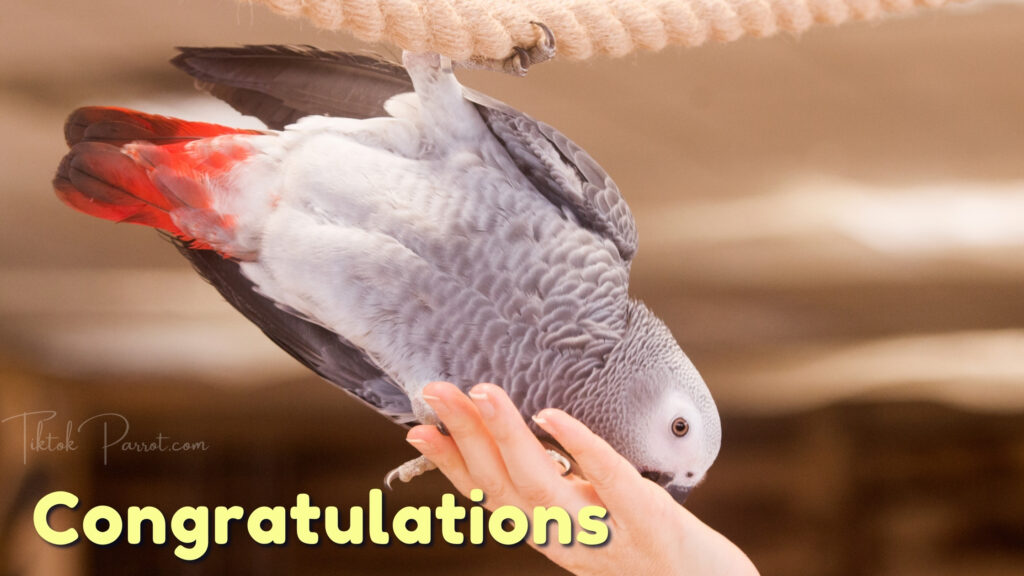
Well done, on completing and reading this ultimate guide about African Grey Parrot Personality, Food & Care! I hope that this article has provided you with valuable information and insights into the care and needs of these intelligent and social birds.
As we know African grey parrots are a long-lived species that require a significant commitment in terms of time, money, and effort. However, with the right care and attention, they can make loving and rewarding companions for many years to come. By following the guidelines outlined in this article, you can provide your African grey parrot with the care and attention it needs to thrive in your home.
Again, remember to choose an African grey parrot from a reputable source, provide them with a suitable cage and accessories, offer a balanced and varied diet, and provide regular training, grooming, and socialization. By taking good care of your African grey parrot, you can help them live a long and healthy life and be a loving and rewarding companion for many years to come.
You may like to read these frequently asked questions (FAQ) about African Grey Parrots.
If you found this blog helpful, It would be great if you could share it with your family and friends who might find it useful as well.
For more useful content about African Grey parrots, you can subscribe my site with your email to get notification upon publishing a new blog, the subscribe box you can see on the right side of this page. Also if you get an alert on your web browser while browsing my site, allow it and that will also give you an alert whenever I publish a new blog.
Stay safe and much love !



